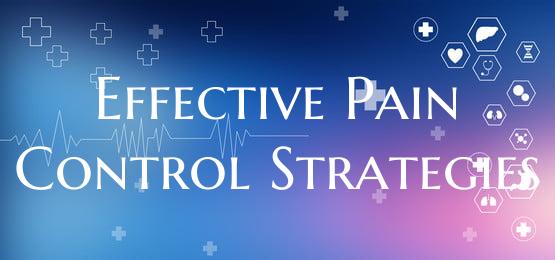
Effective Pain Control Strategies
Introduction: Pain is a complex and subjective experience that can have a significant impact on an individual's quality of life. Finding effective pain control strategies is crucial for managing both acute and chronic pain conditions. By employing a combination of medical treatments, lifestyle modifications, and alternative therapies, it is possible to improve pain management and enhance overall well-being.
Medical Treatments: 1. Medication Management: Nonsteroidal anti-inflammatory drugs (NSAIDs), acetaminophen, and opioids are commonly used to alleviate pain. It is important to work closely with a healthcare provider to determine the most appropriate medication regimen and dosage. 2. Physical Therapy: Physical therapists can help individuals with pain through targeted exercises, stretches, and manual therapies to improve mobility, strength, and function. 3. Interventional Procedures: Injections, nerve blocks, and other minimally invasive procedures can provide targeted relief for certain types of pain, such as back pain or joint pain. 4. Surgery: In some cases, surgical intervention may be necessary to address the underlying cause of pain, such as joint replacement for severe osteoarthritis.
Lifestyle Modifications: 1. Exercise: Regular physical activity can help improve muscle strength, flexibility, and endurance, which can reduce pain and improve overall function. 2. Healthy Diet: Eating a well-balanced diet rich in fruits, vegetables, whole grains, and lean proteins can help reduce inflammation and promote overall health, which may help alleviate pain. 3. Stress Management: Stress can exacerbate pain symptoms, so practicing relaxation techniques such as deep breathing, meditation, and yoga can help reduce stress and improve pain control.
Alternative Therapies: 1. Acupuncture: This ancient practice involves inserting thin needles into specific points on the body to stimulate nerves and muscles, which can help alleviate pain. 2. Massage Therapy: Massage can help reduce muscle tension, improve circulation, and promote relaxation, which can provide temporary relief from pain. 3. Chiropractic Care: Chiropractors focus on spinal alignment and manipulation to alleviate pain and improve overall function.
Conclusion: Effective pain control strategies encompass a multidisciplinary approach that addresses the physical, emotional, and cognitive aspects of pain. By combining medical treatments, lifestyle modifications, and alternative therapies, individuals can better manage their pain and improve their quality of life. It is essential to work closely with healthcare providers to develop a comprehensive pain management plan tailored to individual needs and preferences.